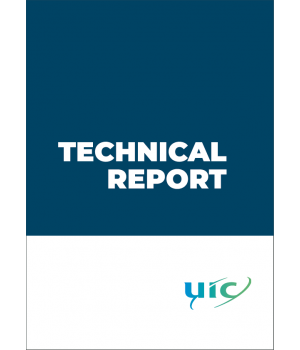
Braking Questions - Composite brake block contour optimisation to reduce equivalent conicity - Synthesis of phase 1 results
Several investigations into the service performance of composite brake blocks have shown that these blocks produce a wear pattern on the wheel profile that is different from the wear pattern produced by cast iron blocks. One of the effects is the increase of equivalent conicity, which is a parameter used in assessing the running stability characteristics of a vehicle. Equivalent conicity changes relatively fast, especially on certain blocks made of sintered material.
In previous investigations the idea had arisen that the contour of the brake block had a significant impact on the wear pattern of the wheel profile and thus it was expected that modifying the block shape would have beneficial effects for the wheel profile. Therefore, in the beginning of 2009 UIC decided to start a project to optimise the shape of the brake block in order to prevent increases in equivalent conicity.
This report seeks to describe and summarise the activities carried out in the first phase of the project and draw some conclusions. The goal of the first phase was to check:
- whether the block shape did actually influence changes in the wheel profile, and
- whether bench tests were a suitable approach for the remainder of the project.
The approach consisted in conducting a certain number of bench tests with several block shapes and qualities, and compare the results with available service data.
"+ "
| ISBN | 978-2-7461-2170-6 |
| Pages | 130 |
Fiche technique
- Langage
- Anglais
- Edition
- Ed. no.1
- Date d'édition
- 01/03/2013
- Date de publication
- 16/10/2013
- Nombre de pages
- 130
- Thème
- Rolling stock Matériel Roulant
- sku
- E_DT433
- Reference
- B 126 / DT 433
 Préférences sur les cookies
Préférences sur les cookies

